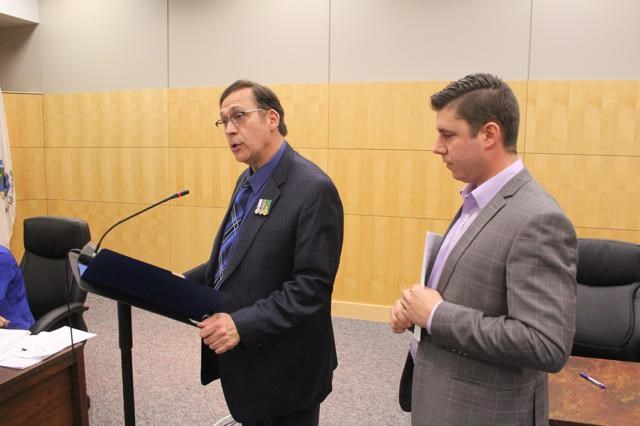By Greg Nikkel
Weyburn’s new city council was sworn in on Monday evening in council chambers, and got right down to work, discussing a variety of issues, including whether the city supports Highway 39 bypassing the city of Weyburn in the “preferred” new route for twinning selected by the Department of Highways.
On the highway issue, along with a couple of other matters which came up on the agenda, the brand new council decided they needed more time to familiarize themselves with the issues before making decisions.
After several comments disapproving of the proposed bypass of Highway 39, council deferred the item to their upcoming retreat to discuss it further, and will have a more definitive answer at their Nov. 28 council meeting.
In the request by Highways for endorsement of the “preferred” route for the high-speed four-lane highway, council was told the planners want to take Highway 39 south around the city. Highways also wanted an answer by Nov. 15, but city engineer Sean Abram noted that he was told the project manager would be able to wait until the end of November for the new council to have time to discuss it.
Coun. Mel Van Betuw wondered if someone from Highways could talk to them directly about this proposal, and Coun. Jeff Richards said he would want input from the Weyburn Chamber of Commerce and Economic Development as well.
Coun. Winston Bailey noted the previous council unanimously opposed this particular proposal to bypass Weyburn, and this was expressed to Premier Brad Wall when he last visited the city.
Abram pointed out that the mandate given by Highways for this highway twinning project was for a free-flowing high-speed route that could accommodate a high volume of truck traffic, and they didn’t want this going through the city.
“This is very early in the project,” he said, pointing out the actual building of this twinned highway could be in five years or 30 years time — they simply don’t know the timeline yet.
“We live in this city, and what the government of Saskatchewan is not recognizing is what the City of Weyburn wants or needs. We don’t want to kill businesses here,” said Coun. Dick Michel.
Asked if any economic impact studies have been done for this proposed route, Abram admitted there haven’t been, and said this would be done once a route is more finalized.
“To me, this would be devastating to the city of Weyburn. We don’t want people to drive around the city at 110 kilometres an hour,” said Coun. Brad Wheeler.
Council will provide their answer to the Highway project manager after their next council meeting on Nov. 28.
One decision that had been put off by the previous council at their last meeting on Oct. 11, regarding the digital sign at the corner of Third Street South and Highway 39, was put off for a month, again to allow council time to become more familiarized with the issues around the LED sign.
In the September report on building permits issued by the city, council was told there were eight permits issued worth a total of $783,500.
Breaking down the permits, one permit was issued for commercial alterations for a new business for pizza pickup at 110 Souris Avenue, worth $50,000; three permits were issued for residential additions or alterations with a combined value of $153,000; three permits for residential garages were issued worth $30,500 in total, and one permit was issued for a new residential dwelling, worth $550,000.
The city has issued year-to-date 61 building permits worth a total of $4,906,600. One year ago at the end of September, the city had issued 72 permits worth just under $9.5 million.
With the approval announced for the new reservoir for the City of Weyburn’s water system, the city will next need to do an environmental assesssment of the project, and once the engineering design is done, tenders will be issued for construction, which is expected to largely take place in 2017-18, and completion in 2018-19.
City manager Bob Smith noted the approvals had actually been in place in September, but the announcements could not be made about it until after the municipal elections were held on Oct. 26.
The provincial and federal governments will each pay about $5.3 million, with the city paying the balance of the project worth an estimated $16.47 million in total.




